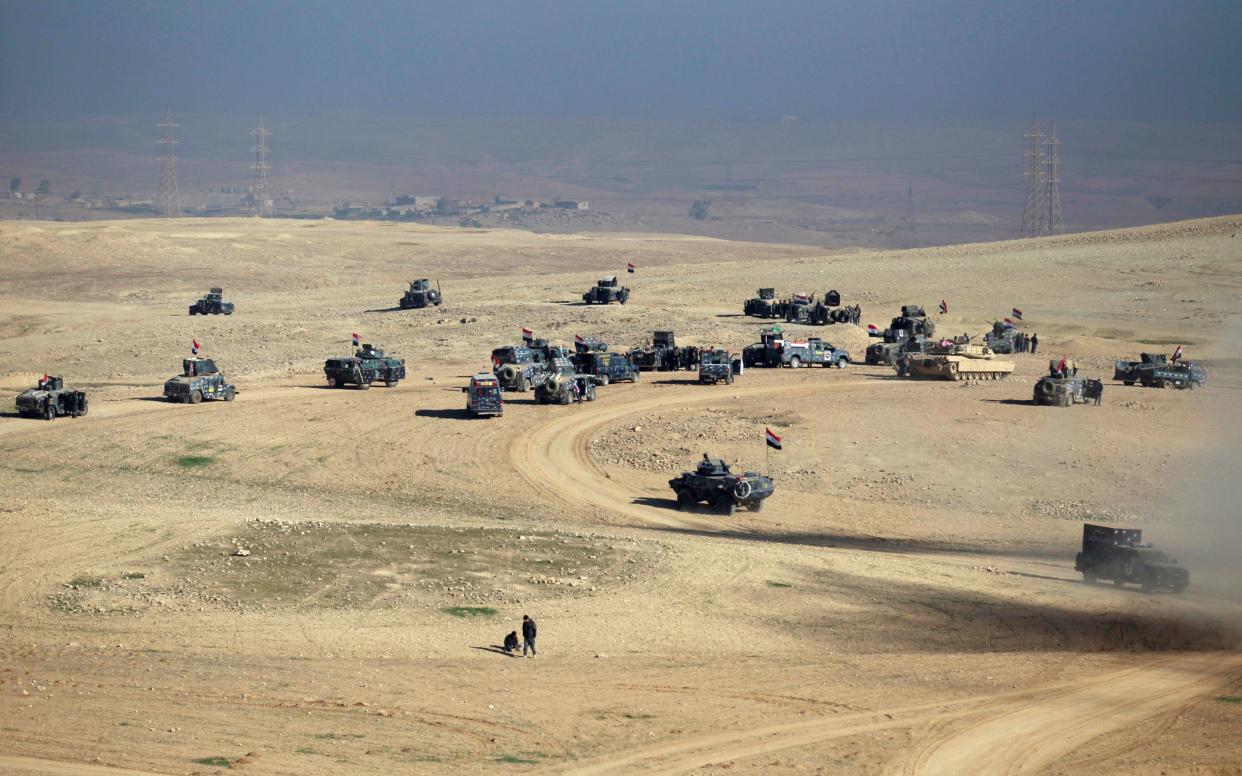'British suicide bomber' strikes Iraq forces near Mosul as offensive against Islamic State continues

A British jihadist suicide bomber blew himself up attacking Iraqi forces as they close in on Western Mosul, according to Islamic State propaganda.
The bomber identified as Abu Zakiira attacked the Iraqi army in the village tal kisoom, south west of Iraq’s second largest city, it is claimed.
Iraqi forces on Monday continued a ground offensive to dislodge Isil militants from their remaining stronghold in western Mosul.
Haider al-Abadi, the Iraqi prime minister, on Sunday announced the start of the campaign, asking Iraqi forces to "respect human rights" during the battle, after a series of shocking videos and images depicting abuse by uniformed men emerged.
US-backed Iraqi forces, including elite units and the federal police, snaked north through the outlying areas of western Mosul on Sunday, backed by coalition air support.
SAS troops also joined the battle alongside US special forces, embedded with Iraqi and Kurdish units under Operation Shader, the codename for Britain’s involvement in the war on Isil.
Officials on the scene described a well-planned campaign delivering early results, with units capturing the villages of Athbah and al-Lazzagah, both near Mosul airport.
The campaign is expected to move north towards Mosul’s crowded city centre, where militants are thought to have entrenched themselves amidst an array of booby-traps, IEDs and human shields.
Up to 400,000 civilians could be displaced by the offensive as residents of western Mosul suffer food and fuel shortages and markets are closed, the United Nations' humanitarian co-ordinator for Iraq, Lise Grande, said.
About 650,000 people are thought to be living in western Mosul and rights groups have voiced concern that civilians, particularly children, could become trapped in what may become a bloody and violent battle.
Since Isil took control of Mosul in 2014, families living there have experienced physical beatings and psychological torment. Even young children, with no school to go to, are shown screenings of executions.
Civilians are banned from having the internet and mobile phones, while televisions and games consoles were removed from homes by the regime. Women are forced to fully cover their bodies.
People who have managed to escape from the city to emergency camps have described being beaten and imprisoned for possessing cigarettes. But the violence won’t necessarily end when the group is defeated.
Once Iraqi forces clear areas of militants, they face the task of processing those left behind, which includes identifying Isil members and supporters.
The launch of the new offensive came as graphic videos emerged of men in Iraqi security forces uniforms taunting, beating and even executing unidentified, unarmed people on the streets of Mosul.
In a statement alleging abuses by the Kurdistan Regional Government’s security forces, Human Rights Watch warned: “Legitimate security concerns do not give security forces license to beat, manhandle or use electric shocks on children.”
Insignias visible in the videos identify the abusers as members of various Iraqi forces, including the elite Counter Terrorism Service, the federal police and various Shi'ite militias known as the Popular Mobilisation Forces.
Several of these groups have been trained by coalition partners in the laws of war.
Calling the footage “deeply disturbing”, the UN’s commissioner for human rights urged the Iraqi government to investigate.
Iraqi planes dropped millions of leaflets on western Mosul warning residents that the battle to dislodge Isil was imminent, the Iraqi Defence Ministry said on Saturday. The leaflets told the jihadists to surrender "or face a fatal end".
Commanders expect the battle to be more difficult than in the east because tanks and armoured vehicles cannot pass through its narrow alleyways.
The militants have developed a network of passageways and tunnels to enable them to hide and fight among civilians, disappear after hit-and-run operations and track government troop movements, according to residents.
Western Mosul contains the old city centre, with its ancient souks, Grand Mosque and most government administrative buildings.
It was from the pulpit of the Grand Mosque that Isil leader Abu Bakr al-Baghdadi declared a self-styled "caliphate" over parts of Syria and Iraq in 2014.
The city, Iraq's second biggest, is the largest urban centre captured by Islamic State in both countries and its de facto capital in Iraq. Raqqa is its capital in Syria.
Isil was thought to have up to 6,000 fighters in Mosul when the government's offensive started in mid-October. Of those, more than 1,000 have been killed, according to Iraqi estimates.
The remainder now face a 100,000-strong force made up of Iraqi armed forces, including elite paratroopers and police, Kurdish forces and Iranian-trained Shi'ite paramilitary groups.
The westward road that links the city to Syria was cut in November by the Shi'ite paramilitary known as Popular Mobilisation. The militants are in charge of the road that links Mosul to Tal Afar, a town they control 60km (40 miles) to the west.
Coalition aircraft and artillery have continued to bombard targets in the west during the break that followed the taking of eastern Mosul.
The US, which has deployed more than 5,000 troops in the fighting, leads an international coalition providing air and ground support, including artillery fire, to the Iraqi and Kurdish forces.
Isil imposed a radical version of Islam in Mosul, banning cigarettes, televisions and radios, and forcing men to grow beards and women to cover from head to toe. Citizens who failed to comply risked death.
Capturing Mosul would effectively end the Sunni group's ambitions for territorial rule in Iraq. The militants are expected to continue to wage an insurgency, however, carrying out suicide bombings and inspiring lone-wolf actions abroad.


